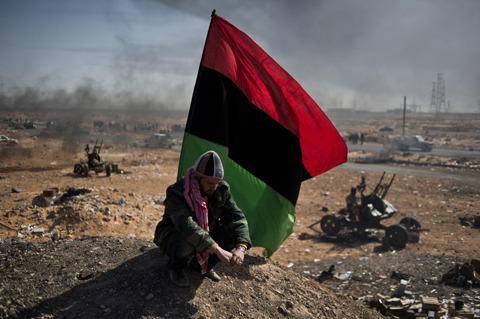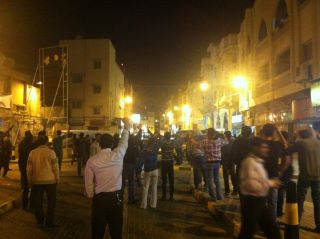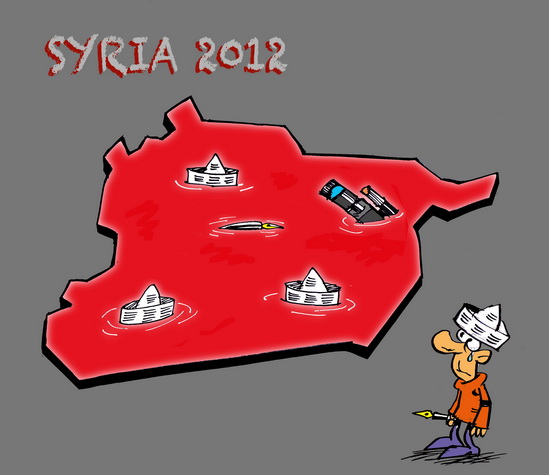Syria (and Beyond) Live Coverage: The Deaths of The Journalists
 Thursday, February 23, 2012 at 16:10 |
Thursday, February 23, 2012 at 16:10 |  Ali Yenidunya in
Ali Yenidunya in  EA Middle East and Turkey,
EA Middle East and Turkey,  Middle East and Iran
Middle East and Iran The award-winning photograph from Libya by Remi Ochlik, who died on Wednesday in Syria
See also Journalism Feature: Marie Colvin Remembered --- "To Report These Horrors of War With Accuracy and Without Prejudice"
Syria Video Feature: Life and Death in Homs
Wednesday's Syria (and Beyond) Live Coverage: The Death of A Journalist
2140 GMT: In Palmyra in Syria, a cameraman films a man firing a rocket-propelled grenade, which strikes far too close for comfort:
2120 GMT: Back from a break to find the report of the Local Coordination Councils of Syria that 101 people, including 14 children, died across the country today --- 47 in Idlib Province, 26 martyrs in Hama, nine in Deir Ez Zor, seven in Daraa, five in Quneitra, four in Homs, two in Raqqa, two in the Damascus suburbs, and one in Aleppo.
A large rally tonight in the Damascus suburb of Douma:
Lawyers in Aleppo protest today in sympathy with the people of Homs:
1700 GMT: An EA correspondent has written from Bahrain, "Got into Manama to join a protest....People are still gathering at the start point. Will keep u posted....They came to us before we start and they shot at us. People are scattered now."
Activist Said Yousif Almuhafda reports, "Riot police are roaming now in Manama and firing sound grenades on any Bahraini group."
1630 GMT: Photojournalist Paul Conroy of The Sunday Times, injured in Wednesday's attack on the media centre in Homs in Syria, has posted a video message. A doctor describes the condition of Conroy, whose leg was wounded in the shelling --- he and others who were injured (see 1400 GMT) cannot be evacuated because of the regime's continuing offensive:
1600 GMT: The Local Coordination Committees of Syria say 61 people have died today --- 24 in Hama 18 in Idlib, nine in Deir Ezzor, two in Homs, three in Quneitra, two in Raqqa, two in Daraa, and one in Douma.
A large funeral procession in the Damascus suburb of Douma for Muhammad Jaarash, killed by security forces:
1500 GMT: French journalist Edith Bouvier, injured in Wednesday's attack on the media centre in Homs in Syria, has appealed in a video to be allowed out of the city for an operation to repair the double fracture in her leg.
Photojournalist William Daniels supports his colleague, "I hope the French authorities can help us as quickly as possible because it is hard here. We don't have electricity; we don't have much to eat. The bombs are still falling."
1455 GMT: Another day of protests at Aleppo University in Syria --- activists report that security forces have fired tear gas, affecting dozens, and made about arrests:
1155 GMT: Activists are reporting that parts of Homs are being occupied by regime forces. One activist, Abo Emad, has told The Guardian that 25 tanks and 35 armoured vehicles and supply trucks had been counted on their way to the city. Speaking from the Baba Amr section, he claimed 100 rockets had landed on the area this morning. There had been no ground invasion, although troops had entered the Jobar area to the southeast.
1135 GMT: The death toll in today's bombings and shootings across Iraq (see 0715 GMT) is now at least 60.
At least 32 people were killed in 10 explosions in Baghdad in mainly Shi'ite neighbourhoods. More than a dozen blasts and attacks, many targeting police, hit other cities across Iraq from Mosul in the north to Hilla, south of Baghdad.
1125 GMT: The United Nations has a secret list of top Syrian officials who could face investigation for crimes against humanity, a panel of UN human rights experts said today.
_The Independent International Commission of Inquiry on Syria indicated that the list goes as high as President Bashar Assad: "A reliable body of evidence exists that, consistent with other verified circumstances, provides reasonable grounds to believe that particular individuals, including commanding officers and officials at the highest levels of government, bear responsibility for crimes against humanity and other gross human rights violations," said the report by the U.N.-appointed "The commission has deposited with the United Nations High Commissioner for Human Rights a sealed envelope containing the names of these people, which might assist future credible investigations by competent authorities."
Navi Pillay, the UN Human Rights Commissioner, has previously called for Syria to be referred to the International Criminal Court. Members of the 47-nation U.N. Human Rights Council are expected to hold a special meeting in Geneva next week, at which the panel's report will be formally presented.
The report claims that the ruling Baath Party's National Security Bureau was responsible for translating government policies into military operations that led to the systematic arrest or killing of civilians. It says the four main intelligence and security agencies reporting directly to Assad - Military Intelligence, Air Force Intelligence, the General Intelligence Directorate and the Political Security Directorate - "were at the heart of almost all operations". It identifies 38 detention centers "for which the commission documented cases of torture and ill-treatment since March 2011".
The panel also details how businessmen helped hire and arm informal pro-government militias known as the Shabbiha: "In a number of operations, the commission documented how Shabbiha members were strategically employed to commit crimes against humanity and other gross violations."
The panel, led by Brazilian professor Paulo Sergio Pinheiro, said its list also identifies some armed opposition cells thought to have committed gross abuses, including the execution of soldiers or suspected pro-government militia members. It added, however, that these were "not comparable in scale and organization with those carried out by the state".
The panel was denied entry to Syria by the regime, which accused it of ignoring official information and exceeding its mandate. The panel instead gathered much of its information from sources outside the country, including human rights activists and Syrian army defectors.
0922 GMT: The opposition Local Coordination Committees of Syria reports, "The number of martyrs today...[is] ten, including a child --- seven in Deir Ez Zor, one martyr in Aleppo, one in Idlib, and one in Daraa."
Activist "Sammy" reports from Syria, "Shelling on Homs, especially on Baba Amr & west part of Inshaat hasn't stopped since the early morning until now (10:40 a.m. --- 0840 GMT)."
Another activist writes, "The regime stopped today transfer calls between Homs and other cities. By this, Homs city is 100% isolated from the world."
A live stream of a funeral in Deir Ez Zor:
0822 GMT: In Bahrain, the February 14 Coalition has called for village protests to support detained human rights activist Abdulhadi Alkhawaja, who has been on hunger strikes for more than two weeks.
Alkhawaja, the founder of the Bahrain Centre for Human Rights, was arrested soon after the start of the February 2011 protests against the regime and sentenced to life in prison.
A march in Karbabad:
0815 GMT: The Iranian cartoonist Nikahang Kowsar, with his trademark journalist, summarises developments in Syria:
0715 GMT: At least 24 people have been killed and 72 injured in bombings and shootings across the Iraqi capital Baghdad.
Nine people were killed in an attack in the central Karrada district near a police checkpoint. Six people were slain by a car bomb in al-Kadhimiya, north of Baghdad, while gunmen in the Sarafiya district killed six at a police checkpoint.
Bombings have been reported in the provinces of Baqouba, Kirkuk, Salahuddin, and Diyala.
0655 GMT: On Wednesday, we titled Live Coverage, "The Death of A Journalist", noting the killing of Syrian reporter Rami al-Sayed as he filmed the Syrian military's shelling of Baba Amr in Homs.
Three hours later, the singular had become plural. A regime shell blew apart the media centre in Baba Amr. Eleven people died, including Marie Colvin of The Sunday Times of London and Remi Ochlik of Paris Match.
The slaying of the award-winning journalists galvanised the media's attention to Homs, but they were only two of more than 80 people killed in Syria on Wednesday, more than 60 of them reportedly in Baba Amr. The Assad regime continued its deadly siege, now approaching its fourth week, of Homs as well as trying to constrict the life out of the opposition in other towns.
All of this overtook but at the same time highlighted the analysis by EA's James Miller that accompanied the start of our Live Coverage on Wednesday: will the events in Homs prompt significant discussion of international intervention and, if so, what form should that intervention take?




Reader Comments